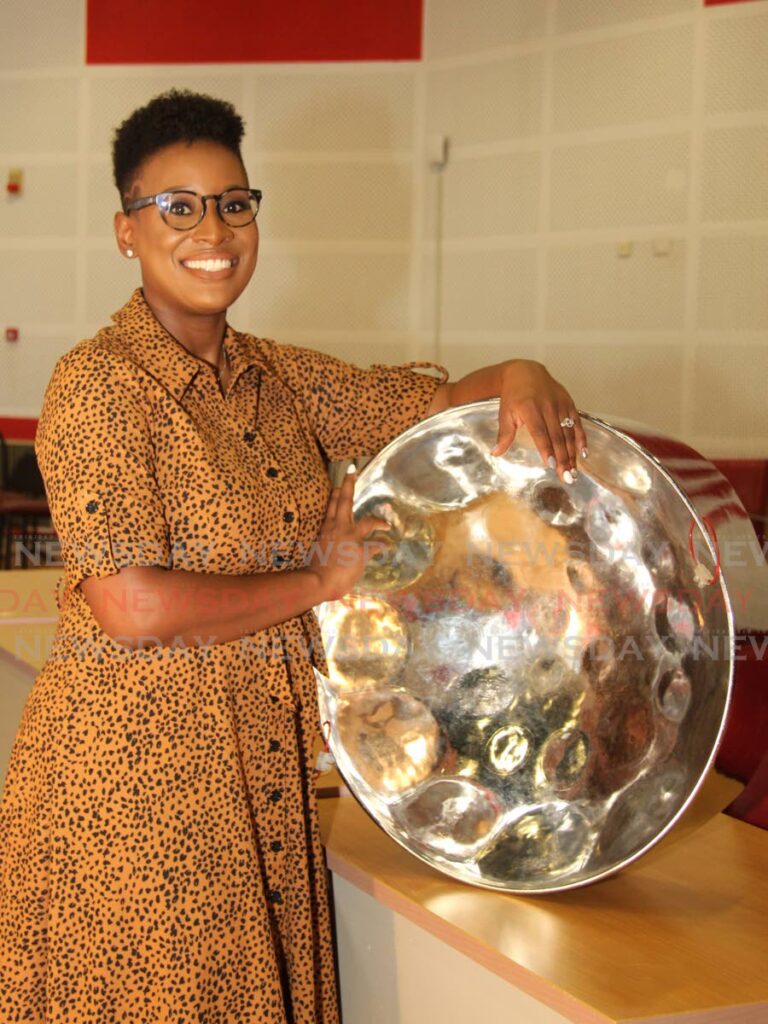Dr Mia Gormandy-Benjamin, an all-star in steelpan music education

Dr Mia Gormandy-Benjamin started playing the steelpan at age five, joined the Massy Trinidad All Stars Steel Orchestra by age nine, and by age 15, had toured the world and won numerous competitions playing pan.
Therefore, it was to no one’s surprise that she chose a career in music and, at age 34, is the assistant professor of music (pan) at the Academy for the Performing Arts, UTT, the artistic director of Massy Trinidad All Stars Steel Orchestra, CEO of PanNotation, and discipline leader for UTT’s APA Pan Fellowship.
She explained that PanNotation was established to allow the uploading and downloading of steelpan music scores, is a library for educational materials, and an interactive platform that connects musicians, educators and steelpan enthusiasts.
She is also the wife of Kygel Benjamin, a pan educator and former percussionist with the National Steel Symphony Orchestra, and the musical director and arranger for All Stars Youth Steel Orchestra, and the mother of two-year-old Milan Benjamin.
Born and raised in Belmont, Gormandy-Benjamin started playing the steelpan when her parents bought one for her older brother. He was not interested but she kept trying to play, even though she could barely reach the instrument.
They realised she was interested and sent her to lessons. At age six, she also started playing the piano but eventually dropped it to focus on the steelpan. That was also the year she entered and won her first competition.
“I think that’s when my parents were like, ‘I think we’re on to something.’”

In addition to performing with All Stars, she also had a solo pan career and sang calypso in Newtown Girls’ Primary School. She went to South East Port of Spain Secondary for one year, then transferred to St Joseph's Convent, Port of Spain.
At age 15, she received a scholarship to attend Northern Illinois University (NIU) to pursue a bachelor of music degree in steelpan performance, which she attained in 2009 with full honours. There, she studied under Prof Liam Teague and national award winner, the late Dr Clifford Alexis.
She told WMN the scholarship was a surprise because she did not apply for it. She recalled being a guest performer at an awards ceremony that was attended by Teague and Dr Larry Snider, professor of music and director of percussion studies at The University of Akron in Ohio.
After the ceremony, she was invited to perform as a guest at NIU and Akron, and Teague basically told her she needed to go to NIU so he would get her a scholarship.
To add to the serendipity of it all, a few weeks before the performance, she had represented TT in an international teen talent competition where the winner had to tour Europe. She came second and so returned to TT.
“When the winner was touring Europe, the awards ceremony took place in Trinidad. So if I had won that competition, I would have completely missed that opportunity.”

At the time, she was attending St Joseph’s Convent and all that happened right before her CXC exams. So, by the time the CXC results were released, she was already a student at NIU, where she also graduated with a master's of music degree in steelpan performance in 2011.
In 2013, she received a second master's, and in 2017, a doctor of philosophy degree in ethnomusicology from Florida State University (FSU).
Ethnomusicology, she explained, is the study of music in terms of culture, history, and within society.
“We have composers who create the music, music theorists who analyse the music, and ethnomusicologists who ask the questions why. We try to understand how culture impacts the creation and performance of music.”
Why ethnomusicology?
While doing her master's at NIU, the students had to do a research project and she wanted to do hers on the history of judging in Panorama. However, she could not find any sources, and the books she found were written by non-Trinidadians.
Upset that no Trinidadians were documenting their own culture, she went to her teacher who suggested she become an ethnomusicologist so she could study world music.
She later found out that research had been done, but she was not able to access the papers and articles because they were either unpublished, behind paywalls, or otherwise difficult to access.
“I wanted to get my PhD in ethnomusicology but the university told me I had to get a master's in it first. But when I got into ethnomusicology, I thought it was about performance. I thought I was going to learn to play all these different styles of music and do research.
“I didn’t fully understand what ethnomusicology was until I was actually attending Florida State. But I eventually enjoyed it and gained a passion for it. I think my drive was to add to the research that had been done, which is actually part of what PanNotation does.”
Gormandy-Benjamin said, over the years, she had students who applied to study ethnomusicology abroad because they saw the need for practitioners in TT.
However, she was concerned about their career paths when they return to TT. She said most ethnomusicologists were hired by universities but she would like to see official positions under the Ministry of Culture or some other funded entity that encouraged the documentation of TT culture.
“Our culture is so rich. There’s so much that we have. We need to start taking it seriously.”
In 2016, while still a PhD candidate, she returned to the country, applied for and was accepted to her position at UTT. Before that, she had spent months in Japan doing research for her dissertation, Pan in Japan: Cultural adoption and adaption of TT’s national instrument.
She told WMN she had job offers from US universities but she had always planned to return to TT. She felt the country needed more people who had experienced the international market, so they could help evaluate the local pan scene and take it from good to great.
She also saw how US students had access to technology and programmes so, when they reached the university level, they had advantages local students did not. And she wanted to change that.
Over the ten years she studied in the US, Gormandy-Benjamin returned to TT many times to play with All Stars for Panorama as well as the Classical Jewels concert series.
One year they asked her to be a guest conductor at Classical Jewels, and in 2019 the artistic director. Then, in February of this year, she became the artistic director for the orchestra.
“I like developing the Classical Jewels concert the most because it’s a platform to try and do things differently and out of the box. I’m all for that. I also like working towards something with the band.
“Also, as my role as director, I oversee the junior academy, developing five-year-olds to 12-year-olds. I don’t have to teach but I guide the tutors and develop the curriculum.”
She also developed the curriculum and learning outcomes for the pan classes for the Catholic Education Board.
She believes the practical and theory of music should be taught together so children could develop skills such as ear training and sight reading at a young age. That will allow local musicians to be equal in skill level to other students if they decide to study abroad.
“When I learned music, it was very separate. I got to grade eight, which is the highest grade in music theory at the Associated Board of the Royal Schools of Music in England, got to NIU and couldn’t sight read.
“That is a major practical element required of you as a professional. So I think merging the two allows you to immediately link the theory with the practical. Because that’s what it’s about in the real world.”
Despite her busy schedule, she continues to play with All Stars for Panorama. Before she became artistic director, she especially liked that she was not in charge, and it keeps her playing skills sharp.
She thanked her former music teacher, Odessa Vincent Brown, who, she said, was instrumental in her development, as well as her family for their unwavering support over the years.
Her father, Mario Gormandy, is a retired fire officer and self-taught pianist, and her mother, Ingrid Gormandy, is an artist who used to work at Port of Spain City Hall. Both were very supportive of her music interests.
She believes her mother’s family told her she could not pursue art and, because she experienced that disappointment, was extremely supportive of Gormandy-Benjamin pursuing her passion.
“My parents, in general, really enjoyed the arts. Both of them having a passion for the arts made them open to me learning and performing. They fuelled the passion I had for pan by allowing me to go to music lessons, enter competitions, physically being there for me during practices and shows, and allowing me to perform abroad even when they couldn’t go.”


Comments
"Dr Mia Gormandy-Benjamin, an all-star in steelpan music education"